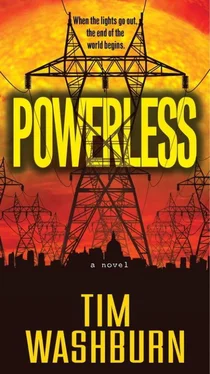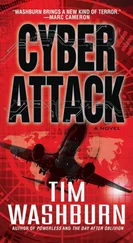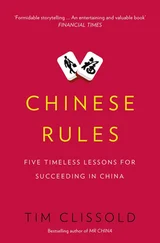Amy Whitworth, the chief speechwriter, hurries into the office and approaches the desk. Her blond hair is pulled up in a ponytail and most of her fingers are stained with blue ink. She slides a sheaf of papers across the desk. “Mr. President, this is the latest draft. But to be honest, sir, I don’t know what to write that won’t cause nationwide panic.”
President Harris riffles the pages with his thumb. “It’s impossible. That’s why I’m thinking about not delivering a speech at all.”
“But, sir, don’t you think that would be irresponsible?”
The President waves a hand at the vacant chair. “Amy, have a seat for a minute.”
She tucks her dress under her legs sits.
“How old are you? Twenty-eight? Twenty-nine?” the President asks.
“I’m twenty-nine, sir.”
President Harris crosses his arms and leans back in his chair. “Let me ask you a what-if question. What would you do if I told you that the power was going to go out for months, maybe years?”
“Well, sir, I’d go get as much water and food as I could. Then, I’d go to the bank and withdraw all of my money. After that, I’d fill up my car with gas and get out of the city.”
“Exactly. And your fellow three hundred million citizens will be trying to do the same thing.”
Amy twirls a stray strand of hair around her finger. “But, sir, don’t you think they have a right to know?”
“That’s the ethical question I’m dealing with. Thank you for all of your work.”
Amy takes that as her cue to leave. As she exits the office, the intercom on the desk buzzes. “Mr. President, Admiral Hickerson on line three.”
The President hesitates, his hand hovering above the handset. “What do you think the grumpy old bastard wants?”
“Hell if I know,” Alexander says, running his finger around the collar of his shirt to loosen it. At five-eight, he wears the same shirt size he wore in college.
Admiral Hickerson, the grandson of a famous World War II admiral, does not lack in ego. He tends to be somewhat disdainful of political presidents, believing they’ll be around at most eight years, whereas he has devoted his life to his country. The President plucks up the handset.
“Mr. President,” the deep voice says, “I’m getting a lot of blowback on activating the National Guard, sir.”
“What kind of blowback, Admiral?”
“Well, sir, no one is privy to the information we possess and many are questioning the reasons for the activation.”
“The reason, Admiral, is because I ordered it. Does there have to be more?”
“No, sir, I don’t suppose there does. But what would you like them to do, sir?”
“Admiral, I don’t care if they stand around scratching their asses. I want them ready to go when this shit storm hits.”
Durant
Some of the color has returned to Robert Marshall’s cheeks. He lies in the hospital bed, an IV above his head dripping fluid into his body. His color isn’t back to normal, but at least it’s now a couple shades darker than the white sheets that surround him. He even feels well enough to carry on a conversation, which Zeke mostly ignores, as his mother and father speak in softened tones.
Zeke paces four steps forward before turning and pacing back along the windowed wall overlooking the corridor. The odors, the subdued lighting, the beeping of the equipment, the constant stream of nurses in and out of the room, the squeaky-clean floors—all a reminder of a time he would rather blot from his memory forever.
“Do you want me to call Ruth?” Zeke says.
His mother turns in his direction. “Why don’t we wait until we have the results of the test, first.”
“But I would want to know if I were her, Mom.”
“I know, son, but she has to care for her fam—” The words die in her throat as her cheeks turn a deep crimson.
“You can say it, Mom. Family. It’s been three years. I know she has a family, but I still think she would want to know,” Zeke says.
“Zeke, I’m sorry. I didn’t mean to… I don’t know what I was thinking.”
“It’s okay, Mom.” Zeke steps toward the door and, without turning to look at his parents, says, “I’m going to walk for a few minutes.”
He wanders down the hallway, with no specific place in mind, just to gain a little distance from his parents.
After the IED exploded beneath our Humvee chaos reigned inside. Through the smoky haze, the screams of my friends were loud enough to penetrate my near deafness from the explosion. The smell of cordite and singed flesh was overpowering. Someone, most likely the soldiers in the following vehicle, pried open the doors and the heavy smoke cleared. The bright beams of several flashlights washed over the interior and I knew immediately that two of my squad members were dead. There was blood everywhere.
Someone grabbed me by the arm and dragged me outside. Pain—all I felt was mind-numbing pain. Someone jabbed a needle into my arm and the morphine coursed through my body, taking the edge off. I must have passed out. My next memory was being loaded into a rescue helicopter. Above, the blades cut through the dark night.
I remained at the base hospital for two weeks. Shrapnel wounds covered my lower body, and my shoulder, which was hit with a large piece of flying debris, looked like hamburger. But I was alive. If I had been riding on the other side of the Humvee, I’d have been dead. At the start of the third week one of the doctors informed me I was being transferred to the VA hospital in Oklahoma City.
After arriving there, I struggled not only with the physical wounds but the emotional wounds—why did I survive and the others didn’t? It was a question I couldn’t answer until I met Amelia. With a head of red, curly hair and skin the color of porcelain, she had freckles sprinkled across the bridge of her beautiful nose. She was nearly as tall as I am, and I took every opportunity to peer into her green eyes as she led me by the elbow along the busy corridors. After four years of nursing, she had witnessed the tragedies of war firsthand, but she hadn’t let the suffering consume her. Her cheery disposition was a welcome relief to every wounded soldier confined to the hospital.
From the first moment I saw her I knew she was the woman I wanted—to care for, to love like no other.
Every soldier in the hospital was in love with Amelia—hell, who wouldn’t be? She was smart as a whip and, though not drop-dead gorgeous, attractive nonetheless. The red hair was often pulled back into a ponytail, revealing a face almost devoid of makeup.
I felt the envious stares of the other wounded soldiers as Amelia and I shared a meal at the two-top table tucked into the corner of the hospital cafeteria. I felt like the guy crowned prom king sharing lunch with her. The way she laughed, the way she cocked her head when she contemplated an answer to another of my endless questions, the way she brushed the strands of hair from her face—each little gesture was magnified in my mind.
“Can we go on a real date?” I blurted out during one of our meals.
“Zeke, if you haven’t noticed, we’re in a hospital. Besides, I make it a policy to not date my patients.” She’d said it with a smile, but my heart was no less crushed.
“What about when I get out of the hospital?”
She paused for a long while. “Maybe.”
NOAA Space Weather Prediction Center
Wednesday, September 29, 12:09 P.M.
Samuel Blake is seated in his office reading through the latest data when Kaylee Connor taps on the door.
Читать дальше












